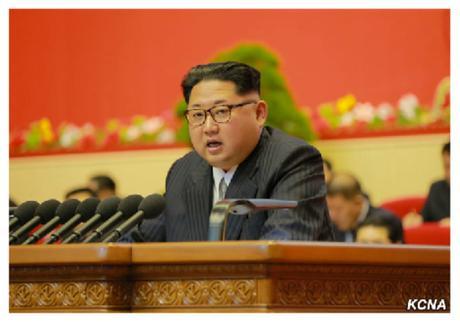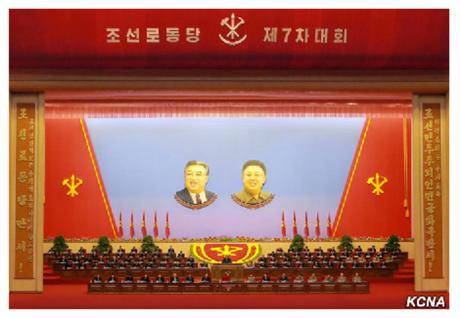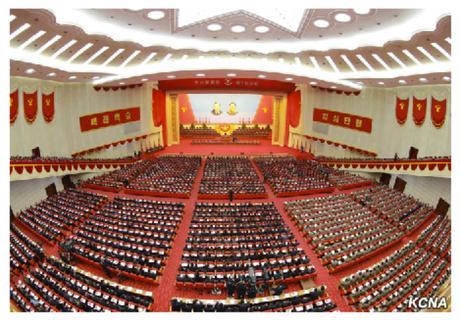
Kim Jong Un delivers the report of the WPK Central Committee during the second day of the 7th Party Congress at April 25 House of Culture in Pyongyang on May 7, 2016 (Photo: KCNA).
Kim Jong Un’s last observed appearance was his attendance at the first day of the 7th Party Congress on May 6
The 7th Congress of the Workers’ Party of Korea [WPK] continued into its second day with the reading of the WPK Central Committee’s report to the congress.
Kim Jong Un (Kim Cho’ng-u’n) attended the 7th Party Congress’ second day along with members of the Party Congress Presidium and Party Congress Secretariat, and delegates and observers to the Party Congress. Among those on the platform during the second day were: Kim Yong Nam (Supreme People’s Assembly Presidium President), Vice Marshal Hwang Pyong So (Director of the Korean People’s Army [KPA] General Political Department), Pak Pong Ju (DPRK Premier), Choe Ryong Hae (WPK Secretary for Workers’ and Social Organizations), General Pak Yong Sik (Minister of the People’s Armed Forces), General Ri Myong Su (Chief of the KPA General Staff), Choe T’ae Bok (WPK Secretary for Science and Education and SPA Chairman), Kim Ki Nam (WPK Secretary for and Director of Propaganda and Agitation), Yang Hyong Sop (SPA Presidium Vice President, Presidium [standing committee] Member of the Democratic Front for the Reunification of the Fatherland and Vice Chairman of the Committee for the Peaceful Reunification of Korea), Vice Marshal Ri Yong Mu (Vice Chairman of the National Defense Commission), General O Kuk Ryol (Vice Chairman of the National Defense Commission), General Kim Won Hong (Minister of State Security), General Choe Pu Il (Minister of People’s Security), Kwak Pom Gi (WPK Secretary for and Director of Planning and Finance), Kim P’yo’ng Hae (WPK Secretary for and Director of Cadres’ Affairs), O Su Yong (WPK Secretary for Light Industry), Kim Yong Chol (WPK Secretary for and Director of the United Front and the DPRK’s chief intelligence official), Ro Tu Chol (DPRK Vice Premier and State Planning Commission Chairman), Jo Yon Jun (Senior Deputy Director of the WPK Organization Guidance Department), other current and former senior cadres and functionaries of the WPK, KPA, internal security services and the DPRK Government, the chief secretaries of WPK provincial committees and directors and senior deputy directors of WPK Departments.

View of the 7th Party Congress platform during the second day of the Party Congress on May 7, 2016 (Photo: KCNA).
The second day of the 7th Party Congress was taken up by the continuation of the Jong Un reading the WPK Central Committee report. After Kim Jong Un finished reading the report, speeches were made by Kim Ki Nam (WPK Secretary for and Director of Propaganda and Agitation), General Ri Myong Su (Chief of the KPA General Staff), Jo Yon Jun (Senior Deputy Director of the WPK Organization Guidance Department), Pak Pong Ju (DPRK Premier) and other Party Congress delegates supported Jong Un’s report.
According to KCNA the speakers “extended the noblest tribute to Comrade Kim Il Sung (Kim Il-so’ng) and Comrade Kim Jong Il (Kim Cho’ng-il),who founded and built the WPK and the highest glory to Kim Jong Un who is ushering in a great heyday in strengthening the WPK.” The speakers stressed that the report “serves as a proud review of the proud victory won by the WPK and the Korean people in the revolution and construction under the banner of great Kimilsungism-Kimjongilism in the period under review and as an encyclopedia political program giving a perfect solution to all problems arising in strengthening the WPK, building a thriving socialist nation and accomplishing national reunification and the cause of global independence.”

Overview of the venue of the 7th Party Congress during its second day, May 7, 2016 (Photo: KCNA).
The second day Party Congress speakers emphasized that “the report serves as an important program that clearly indicates the way for stepping up the drive for modeling the entire party and the whole society on Kimilsungism-Kimjongilsm by more thoroughly establishing the monolithic leadership system of the Party as required by the period of leap forward in the efforts to accomplish the revolutionary cause of Chuch’e. The WPK founded by President Kim Il Sung and guided by leader Kim Jong Il is now shedding its brighter rays as the Chuch’e-type revolutionary party boundlessly loyal to the idea and cause of the leader, invincible integral whole which firmly established the monolithic ideological and leadership system and a genuine motherly party that takes care of the destiny of the people in a responsible manner under the uplifted banner of the popular masses-first principle as it is holding Kim Jong Un in high esteem. In recent years, a series of great world-startling events have taken place in the DPRK and the spirit of great leap forward and innovations of So’ngun (Military-first) Korea has been strikingly demonstrated despite the vicious moves of the US imperialists and other hostile forces to isolate and stifle the DPRK. This is a shining fruition of the efforts all Party members and other people have made to fully embody the indomitable offensive revolutionary idea of the Party and the spirit of the self-development-first principle.”
The speakers “reiterated their will to absolutely trust and follow Kim Jong Un only, remaining single-mindedly united around him in any storm and stress, and to thoroughly carry out the tasks set forth by the congress, regarding it as their invariable faith to remain faithful to the Party and the leader.”
Filed under: 7th Party Congress, Cadre Affairs, Central Committee, Central Military Committee, Central Party Affairs/Cadres 5th Section, central party life, Choe Ryong Hae, Choe Tae Bok, Choe Yong Rim, colonel general, Comprehensive Affairs, DPRK Cabinet, DPRK External Relations, DPRK Premier, Economic Complexes, Financial Planning Department, Gen. Choe Pu Il, Gen. Jo Kyong Chol, Gen. Kim Won Hong, Gen. Kim Yong Chol, Gen. Pak Yong Sik (MPAF), Gen. Ri Myong Su, General Affairs, Guard Command, Hwang Pyong So, Hwang Pyong So (GPD; KPA VMAR), Ideological Works, Information Section, Jo Yon Jun (OGD), KCNA, Kim Family, Kim Jong Un Visits, Kim Jong-il, Kim Jong-un, Kim Ki Nam, Kim Ki-nam, Kim Phyong Hae (Cadres/NPYPPC), Kim Yong Nam, KJI Personal Secretariat, KJI/KJU Ideological Works, Korean People's Army (KPA), Korean People's Internal Security Forces, Korean Workers' Party (KWP), KPA General Political Bureau, KPA General Political Department, KPA General Propaganda Department, KPA Organization Department, KPA Party Life, KPA supernumerary organizations, KPA WPK Committee, Kwak Pom Gi, Local Party Affairs, May 7 Session Party Congress, May 7 Session Party Congress (Day Two), military security command [msc], ministry of people's security, Ministry of State Security, Ministry of the People's Armed Forces (MPAF), MPAF GPB, National Defense Commission (NDC), NDC Administration Department, North Korean press, O Kuk Ryol, O Kuk-yol, O Su Yong, Organization and Guidance Department, PAD Guidance Section, Pak Pong Ju, Party elders, Party History Institute, party life, Party Life Guidance, Political Bureau, primary party committees, Propaganda and Agitation Department, Provincial Party Committees, Provincial Party System, Pyongyang Defense Command, Ro Tu Chol, Secretariat, State Planning Commission (SPC), State Security Department, Supreme People's Assembly, Tae Jong Su, theoretical works, VMar Ri Yong Mu, Workers' and Social Organizations, Yang Hyong Sop
